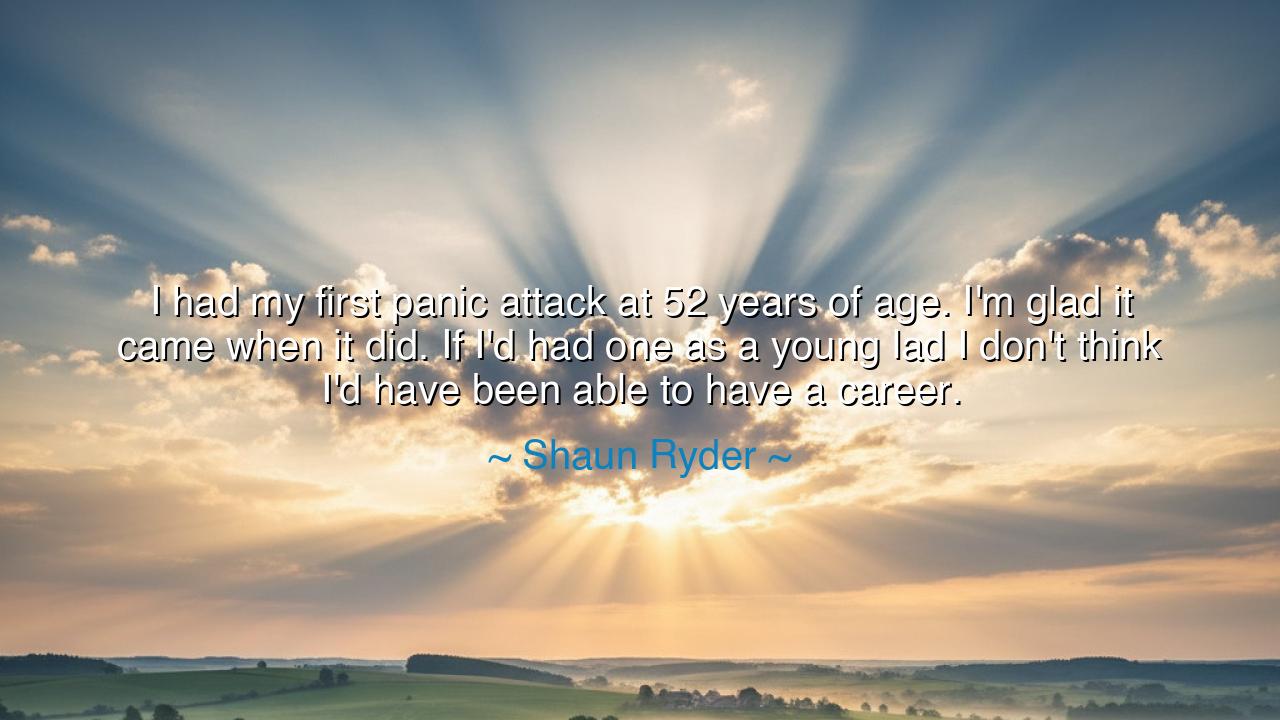
I had my first panic attack at 52 years of age. I'm glad it came
I had my first panic attack at 52 years of age. I'm glad it came when it did. If I'd had one as a young lad I don't think I'd have been able to have a career.






In the words of Shaun Ryder, “I had my first panic attack at 52 years of age. I’m glad it came when it did. If I’d had one as a young lad I don’t think I’d have been able to have a career.” These words, simple yet profound, carry the tone of a man who has walked through chaos and come out the other side with the hard-earned clarity that only time can give. Ryder, the frontman of the Happy Mondays and a symbol of raw, unfiltered creativity, was no stranger to turbulence. His life was marked by excess, fame, and struggle, yet this confession reveals something deeper—a wisdom born not from triumph, but from the humbling force of vulnerability. He speaks here not only of fear, but of gratitude; not only of struggle, but of the strange mercy of timing.
The panic attack, that sudden storm of terror rising without warning from within, is the body’s rebellion against years of silence and strain. To have one at fifty-two is to be struck by the truth that even the strong must one day reckon with fragility. Yet Ryder’s gratitude transforms this experience into revelation: he sees it not as a curse, but as a gift of age. For in youth, such a burden might have shattered him—derailed his art, his spirit, his will to persist. But age had made him tempered, like iron forged in fire. When the storm came, he did not drown in it; he endured it, and through endurance found understanding.
The ancients would have called this the lesson of seasoned strength—the idea that time itself is a teacher, preparing us to bear what once we could not. The young heart is wild, brave, but unguarded. It believes itself invincible. Yet, as the years pass, wisdom quietly builds its armor around the soul. Ryder’s words remind us that some trials, though inevitable, are bearable only when maturity has softened the ego and strengthened the spirit. He was not spared the storm; he was merely given the grace to face it when his heart had grown wise enough to survive it.
Consider the life of Winston Churchill, who in his youth was bold and brilliant, yet reckless and often lost in bouts of despair. He called it his “black dog”—a darkness that haunted him all his life. But had that darkness conquered him early, he might never have risen to lead Britain through its greatest peril. It was age, experience, and failure that taught him resilience. When the world trembled, he stood unbroken. Like Ryder, he came to understand that the trials which come later in life are not punishments—they are the refining fires of destiny.
In Ryder’s story we also see a deeper truth about the mercy of delayed suffering. Life, in its mysterious rhythm, often withholds certain lessons until we are strong enough to bear them. The storms of the soul are not random; they arrive as teachers, not destroyers. When Ryder says he is glad his panic came late, he acknowledges the divine timing of growth. For had he faced such terror in the fragile years of youth—when pride and pressure ruled—he might have collapsed beneath its weight. But by fifty-two, he had lived enough, failed enough, and learned enough to see the panic not as ruin, but as revelation.
The lesson, then, is this: every struggle has its season, and every season its purpose. Do not curse the pain that comes late in life; it comes when you are ready to transform it into wisdom. When the storm rises in your chest and the mind begins to tremble, remember that such moments are not the end, but the unveiling of truth. The heart learns courage not in the absence of fear, but in its embrace.
So, my child, take Ryder’s words as a hymn of endurance. Know that life, in its wisdom, does not always give us our trials when we expect them, but when we can face them. Do not envy the ease of youth, for strength is forged in the long years of struggle and reflection. When fear comes—whether in your youth or in your age—do not flee from it. Stand firm, breathe deeply, and say as Ryder did: I am grateful this came when it did. For that is the voice not of despair, but of mastery—the quiet triumph of one who has learned that even pain, when met with courage, can become the final teacher of peace.






AAdministratorAdministrator
Welcome, honored guests. Please leave a comment, we will respond soon